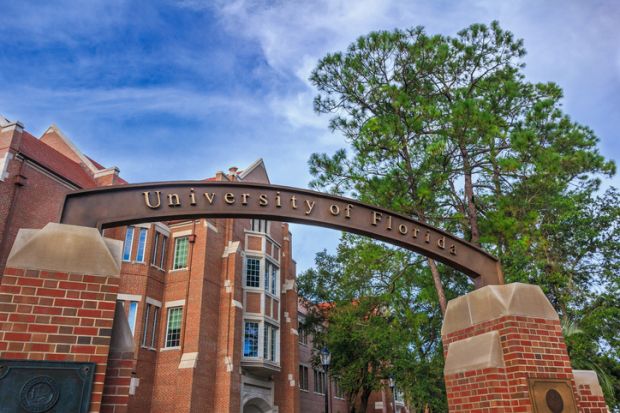Florida politicians are escalating their acts of interference with their state’s public universities, drawing a toughening array of warnings that they risk scaring away top talent from their highly ranked institutions.
The state’s governor and other Republican leaders acted in recent months to subject students and faculty to tests of personal viewpoints, and to bar faculty countering the state in courtroom testimony.
From there, they have moved to erode tenure protections, restrict and interfere in campus leadership searches and appointments, and reduce funding to locations that teach gender and racial equity.
Such extreme partisanship could cost Florida some of its best scholars and their millions of dollars in research grants, the United Faculty of Florida – the academic labour union at the state’s top-ranked institution, the University of Florida – cautioned in a Facebook post that amplified Democratic party arguments against the tenure measure.
A prominent US higher education expert with experience in such matters, Rebecca Blank, the outgoing chancellor of the University of Wisconsin’s flagship campus, endorsed the overall sentiment.
Wisconsin’s troubles began shortly after Dr Blank arrived in Madison in 2013, as state lawmakers cut hundreds of millions of dollars in higher education spending, weakened layoff protections for tenured faculty, and reduced faculty input into campus governance.
Many Wisconsin faculty responded by pursuing outside job options, Dr Blank told Times Higher Education. That forced university leaders to raise staff salaries while they waged a statewide lobbying campaign to reverse the legislature’s moves, she said. In the autumn of 2015, she said, the university handed out $8 million (£6 million) in research funding and more than $700,000 in raises to keep 40 top faculty who otherwise might have left Madison with $18 million in federal research money.
The strategy worked – in large part because Wisconsin’s legislature and regents resumed a more traditional approach to tenure – but the win “required proactive, sustained leadership and investment,” she recalled.
The eventual outcome in Florida was seen as less clear, given that the state’s governor, Ron DeSantis, is widely understood to be harbouring US presidential ambitions while seeing great political benefit in portraying equity-minded educators and their institutions as out of touch with the concerns of most voters.
As in Wisconsin a decade ago, tenure is a favoured target for politicians in Florida and some other Republican-led states. The Florida version, approved this month by lawmakers, takes the authority for periodic performance reviews of tenured professors out of the hands of colleagues and puts it under the control of institutional governing boards, whose members are typically political appointees.
Some of the state actions in Florida have also drawn the attention of the Southern Association of Colleges and Schools Commission on Colleges, or Sacscoc, the main accrediting agency in the southeastern US. Institutional accreditation by a federally recognised agency is necessary for student loan eligibility, and Sacscoc warned that rules preventing faculty testifying in court against the governor’s political interests could be grounds for revoking accreditation.
That led state officials to back off the prohibition. Some Republican lawmakers, however, also initiated legislation that would require public universities to pick a new accrediting agency every five years.
The head of Sacscoc, Belle Wheelan, said she believed that move was ultimately prompted by a separate warning she issued, concerning a failed attempt to install Richard Corcoran – a DeSantis ally and former speaker of the state House of Representatives – as president of Florida State University, the state’s other well-ranked public research institution.
The accreditation violation that Dr Wheelan saw in that case was Mr Corcoran’s membership of FSU’s governing board while standing as an FSU presidential candidate. “Truly an overreaction,” she said of the attempt by Florida’s lawmakers to force all universities to choose new accreditors, “because all he had to do was send a substitute to the meetings until the search was over.”
Register to continue
Why register?
- Registration is free and only takes a moment
- Once registered, you can read 3 articles a month
- Sign up for our newsletter
Subscribe
Or subscribe for unlimited access to:
- Unlimited access to news, views, insights & reviews
- Digital editions
- Digital access to THE’s university and college rankings analysis
Already registered or a current subscriber? Login








